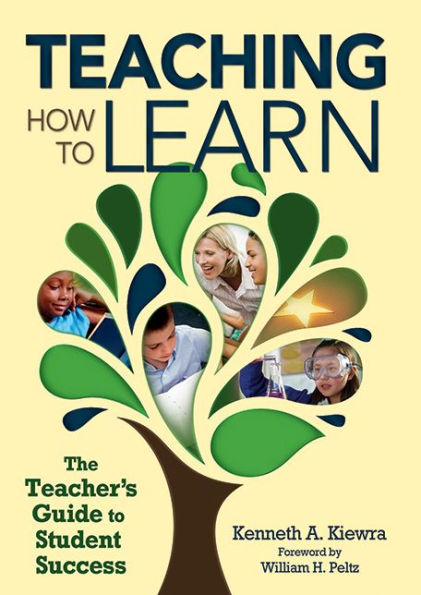SOAR to Success

Books & Articles
Read Selected Articles
Evolution of a Self-Regulation Research Program
View PDF
SOAR Versus SQ3R: A Test of Two Study Systems
View PDF
Using Graphic Organizers to Improve Teaching and Learning
View PDF
Note Taking on Trial: A Legal Application of Note-Taking Research
View PDF
Revising Lecture Notes: How Revision, Pauses, and Partners Affect Note Taking and Achievement
View PDF
What Makes a Matrix So Effective? An Empirical Test of the Relative Benefits of Signaling, Extraction, and Localization
View PDF
Note This: How to improve Student Note Taking
View PDF
Laptop Versus Longhand Note Taking: Effects on Lecture Notes and Achievement
View PDF
A SOAR-Fired Method for Teaching Synthesis Writing
View PDF
What College Instructors Can Do About Student Cyber-Slacking
View PDF

“With respect to the discovery of knowledge, Dr. Kiewra has a long history of being one of the leading researchers in the area of study skills. He is widely recognized as a leading authority on graphic organizers and note taking. Without question, he is the leading scholar on how students learn from lecture.”
—Dr. Stephen Benton, The IDEA Center
Publications
General SOAR to Success
Luo, L, & Kiewra, K. A. (2019). A SOAR-fired method for teaching synthesis writing. The IDEA Center, Idea Paper # 74, http://www.theideacenter.org/.
Daher, T., & Kiewra, K. A. (2016). An investigation of SOAR study strategies for learning from multiple online resources. Contemporary Educational Psychology, 46, 10-21.
Kiewra, K. A., Flanigan, A. E., Luo, L., & Peranetz, M. S. (2016). Teaching learning theories: A SOAR-driven approach. In M. C. Smith and N. DeFrates-Densch (eds.), Innovations and Challenges in Teaching and Learning Educational Psychology. Charlotte, NC: Information Age Publishing, Inc.
Jairam, D., Kiewra, K. A., Rogers-Kasson, S., Patterson-Hazley, M., & Marxhausen, K. (2013). SOAR versus SQ3R: A test of two study systems. Instructional Science, 41, 409-420.
View PDF
Jairam, D., Kiewra, K. A., & Ganson, K. (2012). The SOAR study system: Theory, research, and implications. In M. Edwards and S.O. Adams (eds.). Learning Strategies, Expectations, and Challenges (pp. 71-92). NOVA Science Publishers: Hauppauge, NY.
Jairam, D., & Kiewra, K. A. (2010). Helping students soar to success on computers: An investigation of the SOAR study method. Journal of Educational Psychology, 102, 601-614.
Jairam, D., & Kiewra, K. A. (2009). An investigation of the SOAR study method. Journal of Advanced Academics, 20, 602-609.
Kiewra, K. A. (2009). Teaching How to Learn: The Teacher’s Guide to Student Success. Thousand Oaks, CA: Corwin Press.
Kiewra, K. A. (2005). Learn how to study and SOAR to success. Upper Saddle River, NJ: Pearson Prentice Hall.

“Kenneth Kiewra seems to be a student notetaking research rock star.”
—Derek Bru , Center for Teaching, Vanderbilt University
SOAR to Success – Select (Note Taking)
Kiewra, K. A., Colliot, T., & Lu, J. (2018). Note this: How to improve student note taking. The IDEA Center, IDEA Paper #73, http://www.theideacenter.org/.
Luo, L., Kiewra, K. A., Flanigan, A., & Peteranetz, M. (2018). Laptop versus longhand note taking: Effects on lecture notes and achievement. Instructional Science, 46, 947-971.
Flanigan, A., & Kiewra K. A. (2018). What college instructors can do about cyber-slacking. Educational Psychology Review, 30, 585-597.
Kiewra, K. A. (2016). Note taking on trial: A legal application of note-taking research. Educational Psychology Review, 28, 377-384.
View PDF
Luo, L., Kiewra, K. A., & Samuelson, L. (2016). Revising lecture notes: How revision, pauses, and partners affect note taking and achievement. Instructional Science, 44, 45-67.
View PDF
Igo, L. B., Kiewra, K. A., & Bruning, R. B. (2008). Individual differences and intervention flaws: A sequential explanatory study of college students’ copy-and-paste note taking. Journal of Mixed Methods Research, 2, 149-168.
Igo, L. B., & Kiewra, K. A. (2007). How do high-achieving students approach web-based copy and paste note taking? Selective pasting and related learning outcomes. Journal of Advanced Academics, 18, 512-529.
Titsworth, S., & Kiewra, K. A. (2004). Spoken organizational lecture cues and student notetaking. Contemporary Educational Psychology, 29, 447-461.
Kiewra, K. A., Benton, S. L., Kim, S., Risch, N., & Christensen, M. (1995). Effects of note‑taking format and study technique on recall and relational performance. Contemporary Educational Psychology, 20, 172‑187.
Benton, S. L., Kiewra, K. A., Whitfall, J., & Dennison, R. (1993). Encoding and external-storage effects on writing processes. Journal of Educational Psychology, 85, 267‑280.
Kiewra, K. A., DuBois, N. F., Christian, D., McShane, A., Meyerhoffer, M., & Roskelley, D. (1991). Notetaking functions and techniques. Journal of Educational Psychology, 83, 240-245.
Kiewra, K. A., Mayer, R. E., Christensen, M., Kim, S., & Risch, N. (1991). Effects of repetition on recall and notetaking: Strategies for learning from lectures. Journal of Educational Psychology, 83, 120-123.
Risch, N., & Kiewra, K. A. (1990). Content and form variations in notetaking: Effects among junior high students. Journal of Educational Research, 83, 355-357.
Frank, B. M., Garlinger, D. K., & Kiewra, K. A. (1989). Videotaped instruction and the use of embedded headings and intact outlines. Journal of Educational Research, 82, 277-281.
Kiewra, K. A. (1989). A review of note taking. The encoding-storage paradigm and beyond. Educational Psychology Review, 1, 147-172.
Kiewra, K. A., DuBois, N. F., Christensen, M., Kim, S., & Lindberg, N. (1989). A more equitable account of the note-taking functions in learning from lecture and from text. Journal of Instructional Science, 18, 217-232.
Kiewra, K. A. (1988). Cognitive aspects of autonomous notetaking: Control processes, learning strategies, and prior knowledge. Educational Psychologist, 23, 39-56.
Kiewra, K. A. (1988). Notetaking and review strategies: Theoretical orientations, empirical findings, and instructional practices. Research and Teaching in Developmental Education, 4, 5-17.
Kiewra, K. A., & Benton, S. L. (1988). The relationship between information‑processing ability and notetaking. Contemporary Educational Psychology, 13, 33-44.
Kiewra, K. A., DuBois, N. F., Christian, D., & McShane, A. (1988). Providing study notes: A comparison of three types of notes for review. Journal of Educational Psychology, 80, 595-597.
Kiewra, K. A., & Frank, B. M. (1988). The encoding and external-storage effects of personal lecture notes, skeletal notes, and detailed notes for field-independent and field-dependent learners. Journal of Educational Research, 81, 143-148.
Kiewra, K. A. (1987). Notetaking and review: The research and its implications. Journal of Instructional Science, 16, 233-249.
Kiewra, K. A., & Benton, S. L. (1987). Effects of notetaking, the instructor's notes, and higher-order practice questions on factual and higher-order learning. Journal of Instructional Psychology, 14, 186-194.
Kiewra, K. A., Benton, S. L., & Lewis, L. B. (1987). Qualitative aspects of notetaking and their relationship with information processing ability. Journal of Instructional Psychology, 14, 110-117.
Kiewra, K. A. (1985). Learning from a lecture: An investigation of notetaking, review, and attendance at a lecture. Human Learning, 4, 73‑77.
Kiewra, K. A. (1985). Students' notetaking behaviors and the efficacy of providing the instructor's notes for review. Contemporary Educational Psychology, 10, 378‑386.
Kiewra, K. A. (1985). Providing the instructor's notes: An effective addition to student notetaking. Educational Psychologist, 20, 33-39.
Kiewra, K. A. (1985). Investigating notetaking and review: A depth of processing alternative. Educational Psychologist, 20, 23-32.
Kiewra, K. A. (1985). Examination of the encoding and external-storage functions of notetaking for factual and higher-order performance. College Student Journal, 19, 394-397.
Kiewra, K. A., & Benton, S. L. (1985). The effects of higher-order review questions with feedback on achievement among learners who take notes or receive the instructor's notes. Human Learning, 4, 225-231.
Kiewra, K. A. (1984). Implications for notetaking based on relationships between notetaking variables and achievement measures. Reading Improvement, 21, 145‑149.
Kiewra, K. A. (1984). Acquiring effective notetaking skills: An alternative to professional notetaking. Journal of Reading, 27, 299-302.
Kiewra, K. A., & Fletcher, H. J. (1984). The relationship between levels of notetaking and achievement. Human Learning, 3, 273-280.
Kiewra, K. A. (1983). The relationship between notetaking over an extended period and actual course-related achievement. College Student Journal, 17, 381-385.
Kiewra, K. A. (1983). The process of review: A level of processing approach. Contemporary Educational Psychology, 8, 366-374.
SOAR to Success– Organize (Graphic Organizers)
Luo, L., Peranetz, M., Flanigan, A., Witte, A. L., & Kiewra, K. A. (2014). Eyes never lie: Eye-tracking technology reveals how students study displays. The Nebraska Educator, Paper 18, 60-77. http://digitalcommons.unl.edu/nebeducator.
Jairam, D., Kiewra, K. A., Kauffman, D. F., & Zhao, R. (2012). How to study a matrix. Contemporary Educational Psychology, 37, 128-135.
Kiewra, K. A. (2012). Using graphic organizers to improve teaching and learning. The IDEA Center, http://www.theideacenter.org/.
View PDF
Kauffman, D. F., & Kiewra, K. A. (2010). What makes a matrix so effective: An empirical test of the relative benefits of signaling, extraction, and localization. Journal of Instructional Science, 38, 679-705.
View PDF
Igo, L. B., Kiewra, K. A., Zumbrun, S. K., & Kirschbaum, A. L. (2007). How best to learn confusing word pairs: Construction versus cognitive load theory. Journal of Experimental Education, 75, 130-144.
Igo, L. B., Kiewra, K. A., & Bruning, R. B. (2004). Removing the snare from the pair: Using pictures to learn confusing word pairs. Journal of Experimental Education, 72, 165-178.
McCrudden, M., Schraw, G., Hartley, K., & Kiewra, K. A. (2004). The influence of presentation, organization, and example context on text learning. Journal of Experimental Education, 72, 289-30.
Katayama, A. D., Robinson, D. H., Kiewra, K. A., DuBois, N. F., & Jonassen, D. (2001). Facilitating text learning with adjunct displays. The Journal of Research in Education, 11, 54‑61.
Atkinson, R. K., Levin, J. R., Kiewra, K. A., Meyers, T., Kim, S., Atkinson, L., Renandya, W. A., & Hwang, Y. (1999). Matrix and mnemonic text-processing adjuncts: Comparing and combining their components. Journal of Educational Psychology, 91, 342-357.
Kiewra, K. A., Kauffman, D. F., Robinson, D., DuBois, N., & Staley, R. K. (1999). Supplementing floundering text with adjunct displays. Journal of Instructional Science, 27, 373-401.
Kiewra, K. A., Mayer, R. E., DuBois, N. F., Christensen, M., Kim, S., & Risch, N. (1997). Effects of advance organizers and repeated presentations on students' learning. Journal of Experimental Education, 65, 147-162.
Marchant, G., & Kiewra, K. A. (1996). Visual representations in the teaching of educational psychology. Newsletter for Educational Psychology, 19, 6-7, 18.
Robinson, D., & Kiewra, K. A. (1995). Visual argument: Graphic organizers are superior to outlines in improving learning from text. Journal of Educational Psychology, 87, 455‑467.
Kiewra, K. A. (1994). The matrix representation system: Orientation, research, theory and application. In J. Smart (Ed.) Higher education: Handbook of theory and research. NY: Agathon. Reprinted in R. Perry & J. Smart (Eds.) Effective teaching in higher education: Research and practice. NY: Agathon.
Kiewra, K. A., & DuBois, N. F. (1992). Using a spatial system for teaching operant concepts. Teaching of Psychology, 19, 43-44.
Frank, B. M., Garlinger, D. K., & Kiewra, K. A. (1989). Videotaped instruction and the use of embedded headings and intact outlines. Journal of Educational Research, 82, 277-281.
Kiewra, K. A. (1989). Matrix notes. Educational Technology, 29, 55-56.
Kiewra, K. A., DuBois, N. F., Christian, D., & McShane, A. (1988). Providing study notes: A comparison of three types of notes for review. Journal of Educational Psychology, 80, 595-597.

